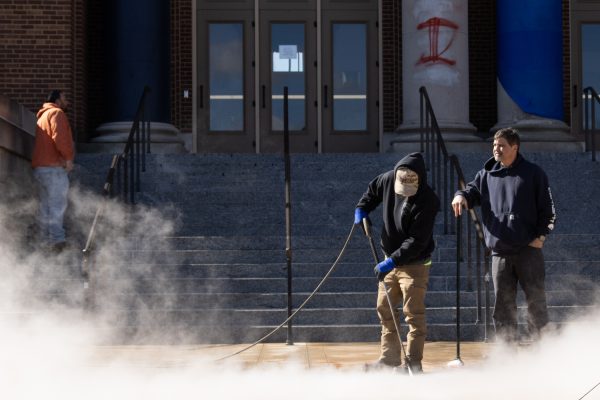Ill. institutionalization should be abolished
October 7, 2008
Imagine that your home is an old brick building that houses 300 people. You’ve grown accustomed to the stark white hallways and dull living spaces, but you’ll never get used to that stench of urine. Meal times are scheduled, rules are posted, and dissent is not tolerated. During the most intimate activities of daily life – showering, using the bathroom, having sex – you are supervised by a complete stranger, and there is nothing you can do about it. Imagine your life without a voice.
There are thousands of citizens in Illinois that don’t have to imagine; this is their reality. They are not prisoners. They committed no crimes. They were simply born with developmental disabilities.
In 2004, the state of Illinois spent nearly $350 million (about $120,000 per person) operating public institutions for people with DD. Most residents did not choose this living arrangement and do not need 24-hour care. Many could live in the community with appropriate support and services for less than $40,000 per year.
But Illinois refuses to progress. It refuses to do what makes sense, both economically and ethically. It refuses to close large, state-operated facilities, as many other states have done. Instead, Illinois relies entirely on institutionalization, which leaves us ranked 51st in the nation for providing community living arrangements for people with disabilities (out of 50 states and Washington, D.C.). Providing humane and dignified services is simply not a priority. Legislative victories are far more important.
In 2004, Gov. Blagojevich agreed to reopen Lincoln Developmental Center, which had been closed for poor treatment of its residents, in exchange for votes on his pension plan in the General Assembly.
Get The Daily Illini in your inbox!
Lincoln, which was described by the Chicago Tribune as a “monstrous, money-chomping, isolated institution,” is a gem compared to Howe Developmental Center in Tinley Park, Ill. Between September 2004 and July 2008, 23 people died at Howe, and autopsies were never conducted. The institution remained open.
The neglect and abuse continued. One resident at Howe was sent to the hospital with a mouthful of cigarette butts and treated for nicotine poisoning.
The federal government soon got involved, federal funding was pulled, and the U.S. Department of Justice launched an investigation of human rights abuses. Finally, three weeks ago, the state declared its intention to close the facility. Twenty-three deaths we can handle, but we’ll do whatever it takes to avoid bad press.
In Illinois, people with disabilities are treated as second-class citizens. They are herded into institutions and given remedial jobs in “workshops” that are often far below their ability levels. They are paid less than minimum wage, often less than one dollar a day, which is completely legal based on the Fair Labor Standards Act. (Ironic name, huh?)
So what can we do to change?
The state of Illinois must end its policy of segregation. The ultimate goal of the state should be closure of publicly operated institutions in favor of community-based living options, which are more cost efficient and provide a better quality of life for people with disabilities.
In addition, the state should comply with national standards for care and services. If we follow the federal government’s rules, we can maximize federal funding.
“Money Follows the Person,” a federal funding program, should be implemented in Illinois. Today, if an individual chose to move out of an institution, he would lose his state funding. If money followed the person, he could use his funding to pay for an apartment, transportation, and a personal assistant. A “Money Follows the Person” program would give individuals more options and allow for greater independence.
Many people with disabilities imagine achieving this independence. They imagine living on their own, working in the community, hiring their direct support staff, and leading a fulfilling life. They imagine having a voice.
The state of Illinois can make this a reality if it reexamines its priorities and makes a commitment to systemic change. Let’s stop imagining and give people with disabilities the rights they deserve.
Katie is a senior in Spanish and political science and thinks the Cubs will do it next year.





